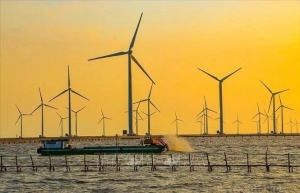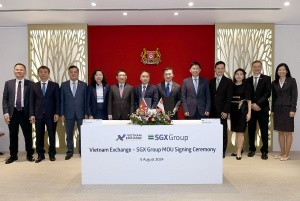Singapore’s venture capital funds covering all bases
Singapore-based venture capital (VC) and private equity firm Clime Capital last month invested $10 million in Vietnam’s clean energy company, Nami Distributed Energy. This investment, facilitated through the Southeast Asia Clean Energy Fund II, aims to support Nami’s accelerated growth and its positive impact on Vietnamese enterprises.
 |
| Singapore’s venture capital funds covering all bases, illustration photo/ Source: freepik.com |
Mason Wallick, founder and CEO of Clime Capital, told VIR, “We have been active in Vietnam since our launch in 2020. We identified Vietnam as having significant potential for developing clean energy infrastructure, not only due to its favourable natural resources like wind and sunshine, but also because its growing economy requires more power.”
Clime Capital’s previous investments in Vietnam include Levanta, which is involved in three wind power projects in Vietnam’s south central and Highland regions; EBoost, an open network electric vehicle charging operator; and Stride, a pioneer in cleantech providing financing solutions and quality assurance for rooftop solar and battery energy storage systems installations for households and small businesses in Vietnam.
The government’s recent introduction of rules on direct power purchase agreements creates significant opportunities for cost-effective renewable energy, Wallick added. With its on-the-ground presence and established relationships in Vietnam, Clime Capital is exploring several potential opportunities, which the fund hopes to advance in the near future. Clime Capital also has funding set aside for both startups and more established clean energy businesses.
Another Singapore-based VC firm, Wavemaker Partners, is also actively investing in Vietnam. In April, Wavemaker Partners invested $1 million in Vietnamese digital marketing solutions provider CNV.
Wavemaker Partners has been investing in Vietnam regularly since 2020, and currently has eight active companies in its portfolio from Vietnam, said principal Phuong Tran.
“We are confident in Vietnam as one of our main markets in Southeast Asia, where we primarily invest. We have maintained a steady pace of investments over the past four years, averaging two deals per year, and we plan to continue this, regardless of whether it is a funding winter or spring,” Tran said.
According to the Vietnam Innovation and Tech Report 2024, released by the National Innovation Centre and Do Ventures in April, Singapore was the most active investor in Vietnam’s tech sector in 2023, with Vietnam ranking second in terms of investment activities. Specifically, 22 Singaporean funds invested in Vietnamese startups last year.
Recently, Singapore-headquartered VC firm Antler hosted a portfolio showcase attended by over 100 VCs and investors who flew into Ho Chi Minh City to meet Antler’s portfolio startups.
“Antler, in particular, will continue to support startups in proving their business viability, scaling up their financial performance, building a capable team, and articulating clear growth strategies to thrive in this funding climate,” said Erik Jonsson, partner at Antler. “We are dedicating $6 million over the next nine months specifically to Vietnam, providing pre-seed capital to inception-stage founders and follow-on funding for each company.”
However, VC funding has decreased across Vietnam’s startup landscape. A report by India-based capital market company Tracxn revealed that total funding into Vietnamese tech startups dropped by 52.7 per cent to $46.5 million in the first half of 2024, compared to $98.5 million in the first half of 2023.
Nevertheless, groups like FEBE Ventures Fund II are focused on global resource allocation, and Vietnam remains a key part of its Southeast Asia focus.
“We are keen to support its dynamic startup ecosystem,” said Olivier Raussin, co-founder at FEBE Ventures. “We are interested in scalable technology startups with global ambitions, including those from Vietnam aiming for a global impact. The fund is industry-agnostic within tech, focusing on sectors like business-to-business, AI, healthtech, and climate-tech.”
To help its portfolio startups navigate challenging times, FEBE Ventures provides support in business development, fundraising, talent acquisition, and strategic guidance to ensure sustainable growth.
Despite the current startup winter, Vietnam holds potential as a startup ecosystem driven by several key factors, Raussin said. “Firstly, Vietnam’s increasing integration into the global economy makes it a strategic location for startups and investors alike. Secondly, the country has a strong education system, particularly in K-12 maths and engineering. And thirdly, the government’s proactive push for technological advancements, such as the development of 5G networks, supports the growth of tech startups.”
 | Singapore to revitalise stock market A newly-established review group with representatives from both the private and public sectors will propose measures to revitalise Singapore’s struggling stock market. |
 | Singapore launches market alliance to facilitate carbon credit trade The Singapore Carbon Market Alliance (SCMA) was launched recently, serving as a national platform that will help connect developers of carbon credit projects with potential buyers. |
 | Vietnam and Singapore ink MoU to promote development of stock markets The Singapore Exchange signs a Memorandum of Understanding (MoU) with the Vietnam Exchange to boost the development of Singaporean and Vietnamese stock markets. |
What the stars mean:
★ Poor ★ ★ Promising ★★★ Good ★★★★ Very good ★★★★★ Exceptional
Related Contents
Latest News
More News
- SK Innovation-led consortium wins $2.3 billion LNG project in Nghe An (February 25, 2026 | 07:56)
- THACO opens $70 million manufacturing complex in Danang (February 25, 2026 | 07:54)
- Phu Quoc International Airport expansion approved to meet rising demand (February 24, 2026 | 10:00)
- Bac Giang International Logistics Centre faces land clearance barrier (February 24, 2026 | 08:00)
- Bright prospects abound in European investment (February 19, 2026 | 20:27)
- Internal strengths attest to commitment to progress (February 19, 2026 | 20:13)
- Vietnam, New Zealand seek level-up in ties (February 19, 2026 | 18:06)
- Untapped potential in relations with Indonesia (February 19, 2026 | 17:56)
- German strengths match Vietnamese aspirations (February 19, 2026 | 17:40)
- Kim Long Motor and AOJ Suzhou enter strategic partnership (February 16, 2026 | 13:27)

 Tag:
Tag:




















 Mobile Version
Mobile Version